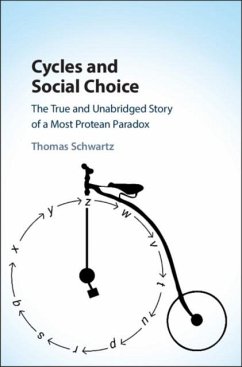The centuries-old paradox of voting is that majorities sometimes prefer x to y, y to z, and z to x - a cycle. The discovery of the sources and consequences of such cycles, under majority rule and countless other regimes, constitutes much of the mathematical theory of voting and social choice. This book explores the big questions posed by the paradox of voting: positive questions about how to predict outcomes and explain observed stability, and normative questions about how to hold elections, how to take account of preference intensities, the relevance of social welfare to social choice, and challenges to formal 'rationality', individual and social. The overall lesson is that cycles are facts, ubiquitous, and consequential in non-obvious ways, not puzzles to be solved, much less maladies or misfortunes to be avoided or regretted.
Dieser Download kann aus rechtlichen Gründen nur mit Rechnungsadresse in A, B, BG, CY, CZ, D, DK, EW, E, FIN, F, GR, HR, H, IRL, I, LT, L, LR, M, NL, PL, P, R, S, SLO, SK ausgeliefert werden.


